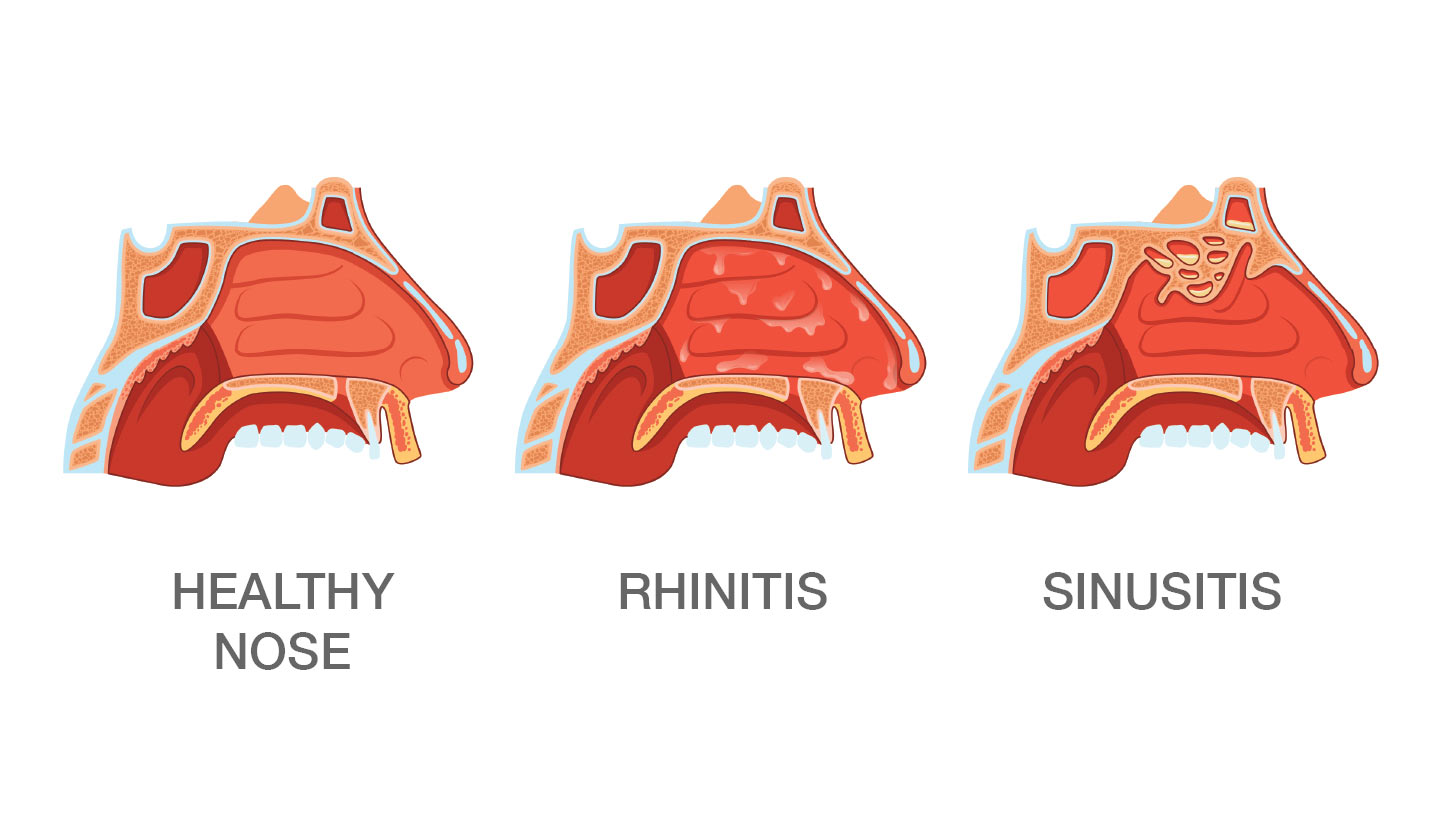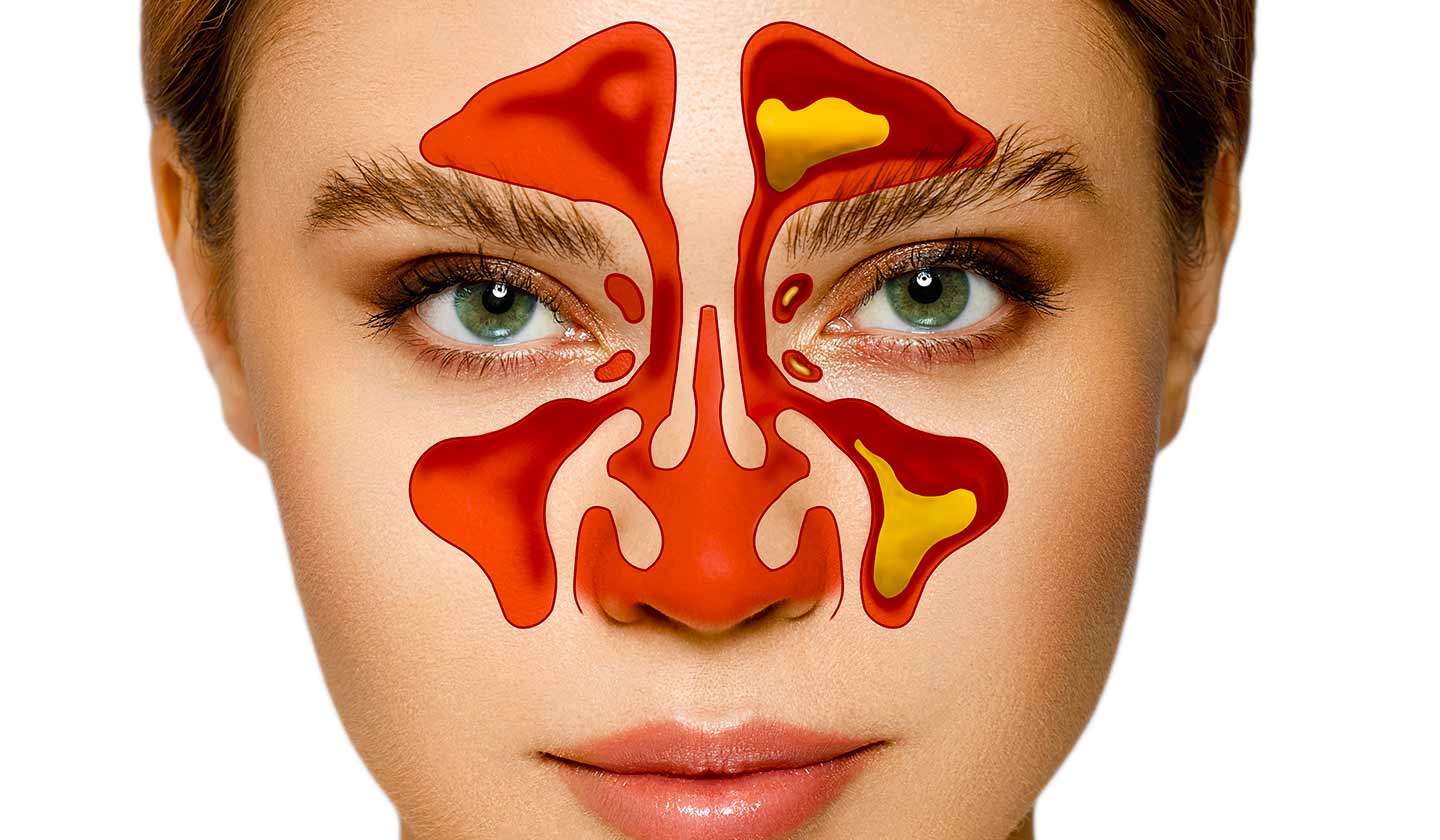Signs and symptoms
Do you know the difference between Rhinitis and Sinusitis?

Allergic rhinitis and sinusitis have nasal congestion in common, for example, but it's important to clarify that they are different health problems. However, one of them can arise as a consequence of the other.
Rhinitis (also known as Hay Fever) is an inflammation of the mucous membrane of the nasal cavities, and can be acute or chronic, occurring in about 25% of the population. The causes are mainly allergies and viruses.
Sinusitis (or "rhinosinusitis") is an inflammation of the mucous membrane of the nasal cavities or sinuses. If it is acute, it can have a viral or bacterial origin, and it is very common for the patient to feel pain in the front region of the head.

Rhinitis
Main causes
Besides allergies and respiratory viruses, inflammation of the mucous membrane lining the nose can be caused by infectious agents (bacteria and fungi), metabolic, autoimmune and degenerative diseases, pregnancy, medication, changes in the autonomic nervous system, drug use, smoking, among others.
Did you know that...
Rhinitis is very common, and it is estimated that it affects about 22% of the Portuguese population.

Did you know...
Infection with the new Coronavirus (Covid-19) causes a rhinitis with loss of smell and taste in about 70% of the cases, usually transient.
The most common cause of rhinitis is respiratory allergy, which occurs in about 25% of the population, often associated with bronchial asthma. It is essential to try to identify the environmental factors that can trigger an attack, such as the presence of mold, dust mites, animal hair, chemicals, cigarette smoke, pollen, and sudden changes in temperature.
The frequency of allergic rhinitis depends on the substance to which the person is allergic. If the allergen is pollen, for example, the symptoms are seasonal and can last for several months. On the other hand, some people suffer from allergic rhinitis all year round.
Common symptoms of allergic rhinitis:
- nasal obstruction;
- aqueous nasal discharge
- sneezing;
- itchy nose and possibly throat, eyes and ears.
Confirming the diagnosis
The ENT doctor will perform a clinical evaluation of the patient and may request nasal endoscopy (flexible or rigid nasofibroscopy) for a complete analysis of the nasal cavity. Allergy sensitivity tests (skin or serological) can also complement the diagnosis.

Most appropriate treatment
In most cases, treatment consists of symptom control, with the goal of improving the patient's quality of life. Oral antihistamines can be used during crises, nasal washings with saline solution or sea water (very important) and the application of intranasal corticoids. There is still the option of treatment with vaccines (sublingual or injectable), according to the results of allergic sensitivity tests, in specific cases. The definitive cure is a little more difficult, due to the diversity of allergens and pollutants in the atmosphere.
Other types of rhinitis
In addition to allergic rhinitis, there is also non-allergic rhinitis, which usually develops during adult life. Although they share many similarities in symptoms, which in this case can last all year round, the causes of each are different.
Some types of non-allergic rhinitis are:
- Viral rhinitis: caused by an infection, such as the flu or a cold.
- Vasomotor rhinitis: characterized by hypersensitivity to stimuli, such as dry air, air pollution, and spicy food.
- Atrophic rhinitis: occurs when the nasal mucosa becomes thinner, hardened, especially with aging, and the nasal passages thus become wider and drier.
- Drug rhinitis: this is caused by certain medications, usually the excessive use of nasal decongestants (nose drops).
Caution! Self-medication can offer health risks. Nasal decongestants (oral or topical) can even momentarily relieve nasal obstruction, but they cause adverse effects such as irritation of the mucosa and consequent rhinitis, as well as aggravating arrhythmias and high blood pressure.

Sinusitis or Rhinosinusitis
This is the name of the inflammation in the mucous membrane of the paranasal cavities or "sinuses" (front, jaw, around or behind the eyes). Sinusitis is caused by obstruction of the ventilation ducts, usually after a respiratory virus (flu or cold) or rhinitis, with consequent accumulation of mucus and bacterial growth, resulting in infection.
The production of mucus is part of the normal functioning of the sinuses, mucus that is expelled to the outside through the nose. When the sinuses become blocked and filled with mucus, it can favor the development of bacteria and infection.
Some of the symptoms of sinusitis are:
- Nasal congestion, making it difficult to breathe through the nose
- Runny nose
- Headache
- Sore throat and/or cough
- Mucus that "slides" from the back of the nose down the throat
- Thick, yellowish or greenish nasal secretions
- Bad breath or bad taste in your mouth
- Feeling of pressure or pain in the face
- Snoring
If these symptoms persist, it is important that you consult your assistant physician or a physician specialized in Otorhinolaryngology.

Treatment
It is based on antibiotics, nasal washings with saline solution and/or sea water associated or not with intranasal corticoid.
1) In viral sinusitis, the symptoms are milder, such as a clear nasal discharge, requiring only symptomatic treatment.
Beware! Indiscriminate and unnecessary use of antibiotics leads to a higher incidence of bacterial resistance.
2) Chronic sinusitis occurs when respiratory symptoms persist for more than four weeks, and facial pain is less frequent than in acute sinusitis. Unpleasant smelling nasal discharge, nasal obstruction, persistent cough, and diminished sense of smell predominate, and nasal polyps may or may not be present.
Painkillers (such as paracetamol or ibuprofen), antibiotics, decongestants, or corticoid nasal sprays may be needed. In some situations, sinus surgery may be indicated to improve drainage of the sinuses and facilitate nasal breathing.
There is a relationship between allergic rhinitis and sinusitis?
Sinusitis is a possible and common complication of allergic rhinitis. Allergic rhinitis leads to nasal obstruction, which in turn clogs the sinuses. In this way, the channels that used to allow the normal drainage of mucus become blocked and this mucus can become infected. In short: In situations where allergic rhinitis is prolonged and not controlled, sinusitis can occur.
When you are diagnosed with allergic rhinitis, your attending physician can make some recommendations and prescribe medication to help control this problem, thus preventing the development of sinusitis.
Sources
MSD Manual
Também lhe poderá interessar
Allergies
Seasonal allergies? Dismissed
Respiratory system






